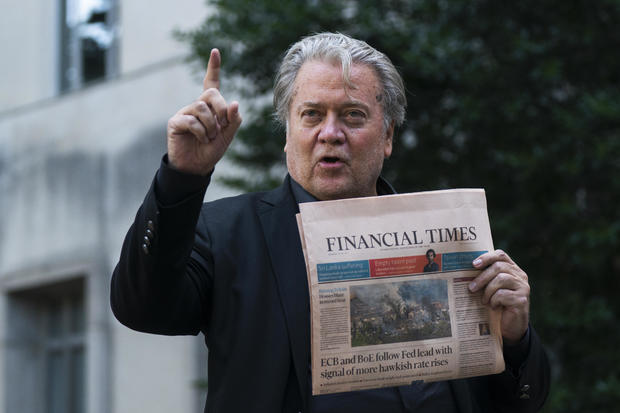Washington — The government in former top Trump strategist Steve Bannon’s criminal contempt trial rested Wednesday afternoon after a day and a half of arguments.
The chief counsel for the House Select Committee investigating the Jan. 6 attack on the Capitol told jurors that it’s “very unusual” for witnesses who receive a congressional subpoena to outright fail to comply, and the committee viewed its referral of Bannon to the Justice Department for criminal contempt of Congress a “very serious step.”
Kristin Amerling said the committee wanted information from Bannon on 17 key topic areas — ranging from his communications with former President Donald Trump to his knowledge of coordination between right-wing extremist groups in carrying out the attack —and needed it fast.
“This information could potentially lead us to other relevant witnesses or other relevant documents,” she said in court Wednesday.
Manuel Balce Ceneta / AP
Trump’s former White House strategist is on trial for criminal contempt of Congress after allegedly refusing to cooperate with a September 2021 congressional subpoena requiring him to sit for a deposition and hand over documents relevant to the committee’s probe.
Prosecutors questioned Amerling about the Bannon subpoena, her communication with his lawyer at the time — Robert Costello — regarding the demands and the various procedures that were in place to either help Bannon comply with the request or resolve any disputes.
Amerling, who said she was deeply involved in the writing and service of the subpoena, said she first emailed Costello the subpoena for Bannon in September. Bannon, Amerling testified, never asked for an extension and did not respond to the request.
During cross-examination, Amerling said she and one of the prosecutors in Bannon’s case, Molly Gaston, “overlapped” while serving on a congressional committee under a Democratic chairman and are now in the same book club. Amerling said she hasn’t attended a book club meeting in about a year and neither has Gaston, but most of the members are connected through the same congressional committee, and it is “not unusual that we would talk about politics in some way or another.”
Under questioning from prosecutors, Amerling said she had no personal relationship with Gaston.
Amerling was also pressed on her party affiliation, testifying she had donated to Democratic causes or candidates in the past.
The revelations came after a morning in which Judge Carl Nichols urged Bannon’s lawyers to avoid bringing politics into the courtroom after prosecutors cited concerns in Tuesday’s opening statements.
“I do not intend for this to become a political case, a political circus,” Nichols said Wednesday. He later allowed Bannon’s team to question Amerling about her affiliation and relationship with the prosecutor.
At the time when the committee issued the subpoena to him, Bannon argued Trump had exerted executive privilege over his testimony, which prevented Bannon from complying with Congress’ commands.
But in court Wednesday, Amerling testified that Trump had never presented the committee with any statement claiming Bannon could be shielded from congressional investigation because of his close proximity to the Trump administration.
“There hadn’t been an assertion, formal or informal, of executive privilege,” Amerling told Bannon’s defense attorney, Evan Corcoran. Multiple federal courts, including the Supreme Court, have denied Trump’s claims of executive privilege challenges to the select committee’s power.
Amerling explained that she and Costello engaged in a “substantial back and forth” over Bannon’s decision not to testify due to executive privilege and the committee alerted Costello that Bannon would be considered in “willful noncompliance” if the subpoena continued to go unanswered. The committee, she said, would not have recognized the executive privilege claim.
The House voted to hold Bannon in criminal contempt of Congress in October, referring the case to the U.S. attorney’s office in D.C. for investigation. Bannon was later indicted by a federal grand jury and pleaded not guilty to two counts of contempt.
Last week, Bannon told the Jan. 6 committee in an about-face that he’s willing to testify — publicly — after Costello said Trump had reversed course on his executive privilege claims.
Prosecutors tried to prevent Bannon’s defense team from introducing his change of heart into evidence for the jury to consider, but in court on Wednesday, Bannon’s lawyers convinced Nichols to allow them to question Amerling about her recent correspondence with Costello about the issue.
Nichols instructed the jury that the July 9 letter indicating Bannon’s willingness to testify is only to be used as potential evidence of Bannon’s view of the subpoena’s deadline and not for any other purpose — did Bannon willfully ignore the subpoena in October?
“Whether or not Mr. Bannon in the future complies with the subpoena is not relevant to whether or not he was in default in October,” Nichols instructed the 14 members of the jury.
Amerling testified that the letters indicated Chairman Thompson was open to Bannon appearing for a deposition once the demands for documents are met and later said Thompson indicated the earlier contempt referral against Bannon remained. Bannon had yet to provide any relevant documents, Amerling said, and had still not met the requirements of the original subpoena for his testimony.
Prosecutors also called FBI Special Agent Stephen Hart as a witness on Wednesday. He testified to Steve Bannon’s public comments about the subpoena. He detailed Gettr posts Bannon appeared to make that featured news headlines indicating Bannon would not comply with the committee’s requests.
